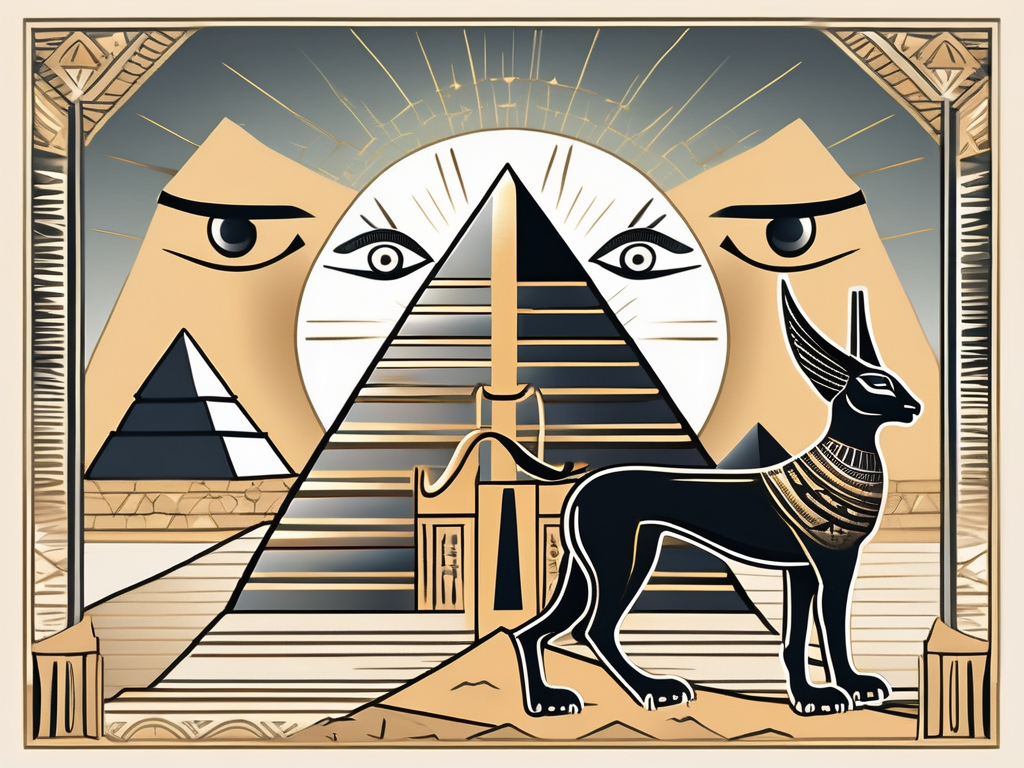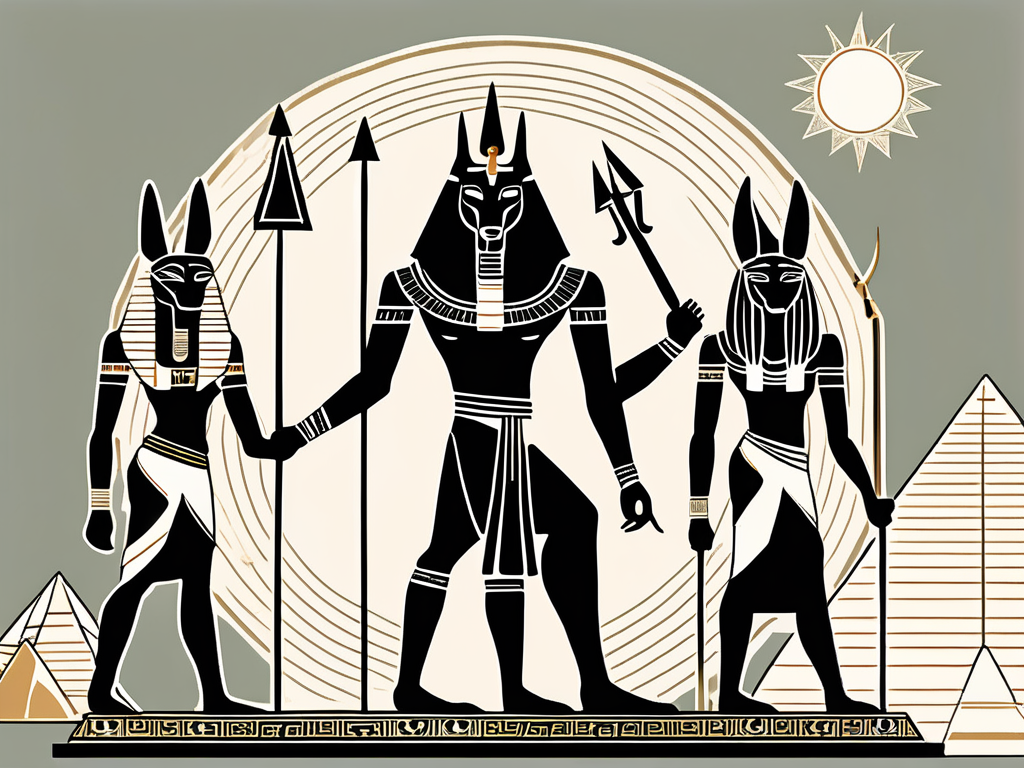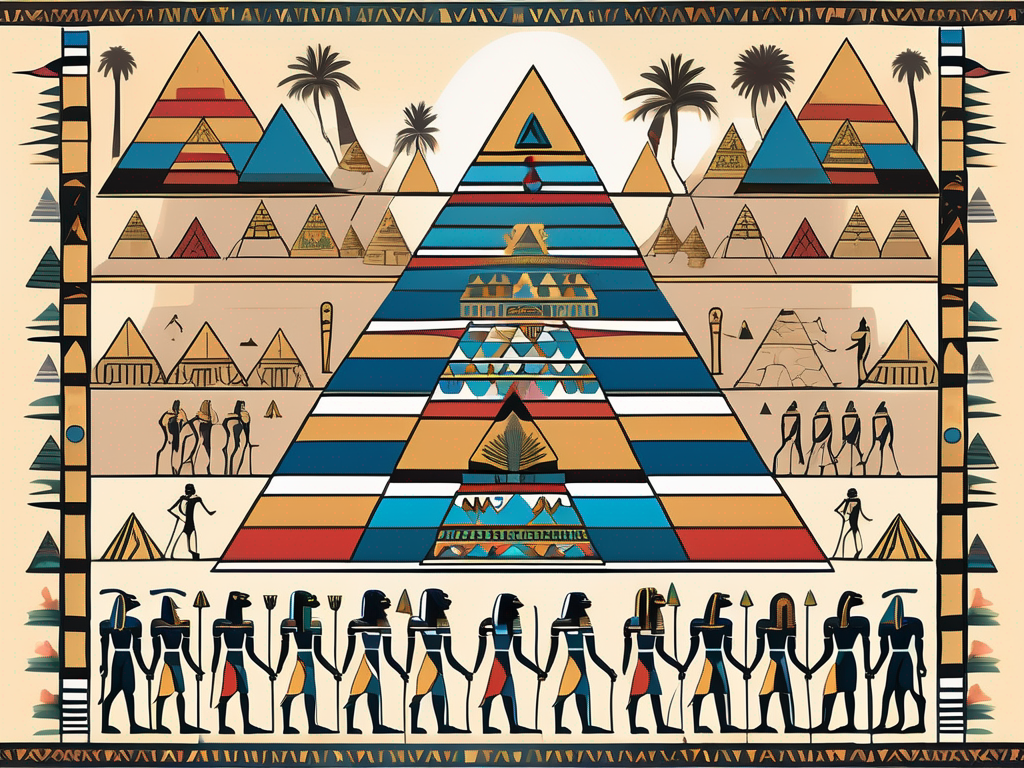Ancient Egypt was a civilization rich in culture and steeped in religious beliefs. One of the most intriguing aspects of their society was the worship of gods and goddesses. This article delves into the fascinating world of Egyptian god worship, with a particular focus on the significance of offerings.
Understanding the Concept of God Worship in Ancient Egypt
Religion played a crucial role in the lives of ancient Egyptians. They believed in a vast pantheon of gods and goddesses who governed various aspects of life, including the universe, nature, and human affairs. The gods were seen as powerful beings who controlled the forces of nature and controlled the destiny of individuals and the society as a whole.
For the ancient Egyptians, worshiping the gods was not just a religious duty; it was a way of maintaining order and harmony in the world. They believed that by offering gifts and sacrifices, they could maintain a positive relationship with the divine and secure their favor and protection.
The Role of Religion in Ancient Egyptian Society
In ancient Egyptian society, religion permeated every aspect of daily life. It influenced their art, architecture, politics, and even their understanding of death and the afterlife. The temples dedicated to the gods served not only as places of worship but also as centers of community and learning.
The priests and priestesses played a vital role in the religious rituals and ceremonies. They acted as intermediaries between the gods and the people, ensuring that the offerings were properly made and the gods were pleased.
Ancient Egyptians believed that the gods were present in the temples, and through rituals and prayers, they could communicate with them. The temples were magnificent structures, adorned with intricate carvings and paintings depicting the gods and their stories. People would gather in these temples to seek guidance, offer prayers, and participate in religious festivals.
Religious festivals were an integral part of ancient Egyptian society. They were occasions of great celebration and joy, where people came together to honor the gods and express their devotion. These festivals involved music, dance, feasting, and elaborate processions, creating a sense of unity and community among the people.
The Pantheon of Egyptian Gods and Goddesses
The pantheon of gods and goddesses in ancient Egypt was vast and diverse, with each deity having their own unique attributes and powers. Some of the most well-known gods include Ra, the sun god; Isis, the goddess of magic and fertility; and Osiris, the god of the afterlife.
Ancient Egyptians believed that the gods were not only powerful beings but also had human-like qualities and emotions. They believed that the gods could be pleased or angered, and their actions could have a direct impact on the lives of individuals and the society as a whole. Therefore, worshiping the gods was seen as a way to seek their favor and protection.
Each god had their own cult and was worshiped in different regions of Egypt. The worship of the gods varied, with some gods being revered throughout the kingdom, while others had a more localized following. The temples dedicated to these gods were built in their honor, and people would bring offerings and prayers to show their devotion.
Ancient Egyptians also believed in the existence of lesser deities, known as the “netjeru,” who were associated with specific aspects of life, such as fertility, childbirth, or agriculture. These lesser deities were often depicted in art and were believed to have the power to influence the daily lives of individuals.
Overall, the concept of god worship in ancient Egypt was deeply ingrained in the society and influenced every aspect of their lives. It provided a sense of purpose, order, and connection to the divine, ensuring the well-being and prosperity of the people.
The Significance of Offerings in Egyptian Religious Practices
Offerings played a central role in Egyptian religious practices. They were believed to nourish the gods and sustain their power, ensuring the continued order and prosperity of the world. These offerings ranged from simple offerings of food and drink to elaborate rituals and ceremonies.
Types of Offerings and Their Meanings
The types of offerings made in ancient Egypt were diverse and symbolic. Food offerings such as bread, fruits, and vegetables symbolized sustenance and abundance. Wine and beer were also common offerings, representing joy and celebration.
In addition to food and drink, Egyptians offered flowers, incense, and precious objects such as jewelry and statues. These offerings were seen as symbols of beauty, fragility, and wealth, expressing the devotion and gratitude of the worshippers.
Rituals and Ceremonies Associated with Offerings
The rituals and ceremonies associated with offerings were intricate and elaborate. The priests and priestesses would perform purification rituals before presenting the offerings to the gods. Incense would be burned, and prayers chanted to invoke the presence of the deity.
These rituals often took place in the temples, with the worshippers gathering to participate in the communal act of worship. Music, dance, and processions were also common features of these ceremonies, adding to the festive and spiritual atmosphere.
The Connection Between Offerings and Egyptian Gods
The offerings made by the ancient Egyptians were not generic gestures; they were specific to each deity. Different gods had different preferences and requirements when it came to offerings, reflecting their unique attributes and roles in the cosmic order.
Specific Offerings for Specific Deities
For example, offerings to Ra, the sun god, often included symbols of the sun such as gold and honey. Offerings to Isis, the goddess of magic, would often include items associated with healing and protection, such as amulets and herbs.
Each god had their own distinctive offerings, and the worshippers would tailor their offerings accordingly, seeking to please and appease the specific deity they were devoted to.
The Impact of Offerings on the Favor of Gods
A common belief among the ancient Egyptians was that making offerings could influence the favor of the gods. By offering their most valuable possessions and performing the rituals with utmost devotion, they hoped to gain the blessings and protection of the deities.
It was believed that the gods would reciprocate these offerings by bestowing blessings, good health, and prosperity upon the worshippers. The relationship between the people and the gods was seen as reciprocal, with both parties contributing to the harmony and well-being of the world.
The Evolution of Egyptian God Worship and Offerings
Over time, the worship practices in ancient Egypt evolved, reflecting the changing political and social landscape of the civilization. The religious practices were influenced by the rise and fall of different dynasties and the interactions with other cultures and religions.
Changes in Worship Practices Over Time
For instance, during the reign of Akhenaten, worship shifted towards the sun god Aten, and traditional offerings and rituals were abandoned. The focus on monotheistic worship altered the religious landscape, but ultimately, the traditional practices were restored after Akhenaten’s death.
Similarly, as Egypt came under the influence of foreign powers such as the Greeks and Romans, there was an amalgamation of religious beliefs and practices. This resulted in new gods being introduced and changes in the ways offerings were made.
The Influence of Politics and Society on Worship Practices
Politics and society also played a significant role in shaping worship practices. Pharaohs, as divine rulers, had a direct impact on the religious landscape of Egypt. They would often promote the worship of certain gods to solidify their own power and maintain control over the masses.
Social hierarchies and cultural norms also influenced the accessibility of worship. The elite had more resources and privileges when it came to making grand offerings, while the commoners often had to rely on simpler gestures of devotion.
The Legacy of Egyptian God Worship in Modern Times
Although the ancient civilization of Egypt has long been gone, its religious practices and beliefs have left a lasting impact on the world.
The Persistence of Ancient Rituals in Contemporary Egypt
In modern-day Egypt, there is still a strong connection to the ancient religious practices. Some of the rituals and festivals associated with the worship of the gods, such as the annual flooding of the Nile, continue to be celebrated, albeit with variations and adaptations.
Visiting the temples and making offerings to the gods is still a common practice, especially during religious holidays and significant life events. These ancient traditions serve as a reminder of the rich cultural heritage and provide a sense of continuity in an ever-changing world.
Egyptian God Worship in Popular Culture and Media
The fascination with ancient Egypt transcends time and has permeated popular culture and media. From movies and books to video games and fashion, Egyptian gods and their worship have become a source of inspiration and intrigue.
The symbolism of offerings and the connection to the divine continue to captivate the imagination of people worldwide. It is a testament to the enduring legacy of the gods and goddesses of ancient Egypt.
In conclusion, the field of offerings in Egyptian god worship is vast, encompassing the complex beliefs and practices of the ancient civilization. From understanding the importance of offerings to exploring the evolution of worship practices over time, it is evident that the worship of the gods played a crucial role in the lives of the ancient Egyptians. The legacy of these practices can still be seen today, both in the enduring rituals of contemporary Egypt and in the popular culture that draws inspiration from the captivating world of Egyptian god worship.












